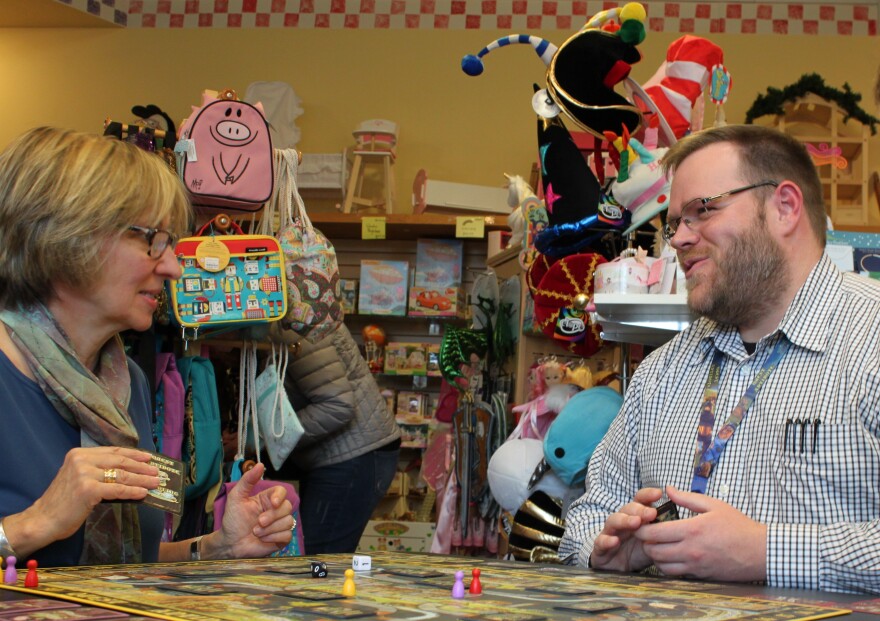As you do your gift shopping this year, you may find yourself looking at board games — specifically hobby games, which are intended for an older, more strategically minded audience than, say, “Candyland.”
Some might have predicted that the rise of video games would hurt board games, but hobby games, like “Settlers of Catan” and “Pandemic,” are growing — and one of the biggest new games comes from right here in Maine.
Back in 2011, Tom Deschenes made a goal: to invent a board game. He’s a college administrator who lives in Portland, and he’s an avid board gamer.
“I really got into board gaming about 10 years ago,” he says. “I have some college friends who invited me to start participating in some of their game nights, and I fell in love with board games. I have about 200 games in my personal game library, but that’s really modest for a lot of board gamers, believe it or not.”

After some deep thinking, and reading some Gothic novels, he came up with a concept.
“In my game, players are going to be poisoned, and they’re going to have to venture out and race against the clock to collect the things they need for their antidote, and try to get back to the apothecary’s before expiring, but they’re going to fight wizards and monsters and dragons along the way,” he says.
Over the next few years, Deschenes spent countless hours and thousands of dollars of his own money on making “Quest for the Antidote” a reality.
At Rainbow Toys in Falmouth, Addison Maxham, 9, is learning to play the game. She rolls the dice, moves her piece a few spots, and meets a monster — the vile kitten. It’s one of the strange monsters in “Quest for the Antidote.”
Addison, her mom and her sister are all here, and are thinking they may pick up the game for Addison’s father for Christmas.

“My dad really loves games, so I’m seeing if this would be up his alley, and I think it is, so far,” she says.
“They’ve always been a staple for us,” says Julie Steinbach, who owns Rainbow toys, “but I would say that in the past few years games have become even more significant in our sales, because people are looking for things that the whole family can do together, getting their kids away from screens.”
It’s not just at toy stores that hobby games are growing — it’s the industry as a whole. According to ICV2, which tracks numbers for the gaming industry, sales of hobby games have nearly doubled over the past 4 years — $735 million in 2013 to $1.4 billion in 2016.
Retailer Bull Moose, which has nine stores in the state along with three in New Hampshire, has seen a huge surge in sales of games like “Quest for the Antidote.”
“[They’re] really hot right now. I just ran some quick numbers and found that we’re up something like 132 percent in board game sales year over the year. And even if we didn’t sell another whole game until 2018 — like we sold zero board games between now and then — we’d still be up like 90 percent,” says Bull Moose’s Mick Pratt.

It’s hard to say exactly what has been going on, but Pratt says there seems to be a general consensus that board games bring people together in a way that digital media just can’t.
“There’s a whole social aspect that is really awesome,” he says. “Friends and family board game nights, or you can go to hobby stores and interact with other hobbyists.”
Pratt says “The Quest for the Antidote” has been a “runaway success,” outselling big hitters like “Settlers of Catan” and “Pandemic.” He says people like it because it’s local — it’s even illustrated by a Bangor artist, Scott Sherman. And he says it’s a good game.
It’s doing well outside Maine too — helped along by distribution from Upper Deck, a big company that sells trading cards and games all over the world. So, Deschenes says, it’s everywhere.
“There are copies of ‘Quest for the Antidote’ that are available now in France, in Germany, in Australia, England, and we have a fan in Lithuania, I just found out the other night,” he says.

If the game does well over time, and Deschenes gets lucky, “Quest for the Antidote” could become its own brand, with spin-off games, character toys or trading cards. Back at Rainbow Toys, 8-year-old Jack Verville of Falmouth is already judging the game a success.
“It’s pretty cool because you get to battle all these cool legendary monsters that you couldn’t battle in real life,” he says.
Monsters such as the bloated gnome, the jittery skunk, the throttling dwarf and, of course, the vile kitten.
This story was originally published Dec. 20, 2017 at 3:45 p.m. ET.


